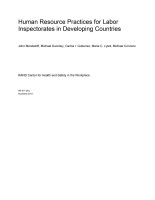| 来源类型 | Research Reports
|
| 规范类型 | 报告
|
| 来源ID | RR-917-DOL
|
| Human Resource Practices for Labor Inspectorates in Developing Countries |
| John Mendeloff; Michael Dworsky; Carlos Ignacio Gutierrez; Maria C. Lytell; Michael Connors
|
| 发表日期 | 2014
|
| 出版者 | RAND Corporation
|
| 出版年 | 2014
|
| 页码 | 28
|
| 语种 | 英语
|
| 结论 |
Inspectorate Practices Vary Widely- Some countries require new inspectors to have a specified minimum level of education; education in specific content areas, such as law or engineering; or threshold physical or personal characteristics.
- Some countries do or should require inspectors to be generalists, while others need more-specialized personnel.
- Initial training for new inspectors must cover a huge range of content. Amounts of ongoing training vary.
- Inadequate staffing and poor work conditions contribute to high turnover among inspectors.
- Measuring inspectors' performance can be difficult because the most easily measured metric is number of inspections performed, which might not be the most important metric.
- Corruption, often because of bribery, is difficult to track and even harder to combat.
|
| 摘要 |
- The argument for hiring generalists seems strongest in the poorest countries. In those countries, technical knowledge is rare, and transportation difficulties are likely to loom especially large. Even for middle-income countries, the choice should depend as well on the likely overlap of occupational safety and health hazards and other labor-standard violations.
- Creation and maintenance of an internationally comparable taxonomy of labor inspectorate HR practices may be a useful first step toward comparative research on the effectiveness of different practices, but the lack of reliable outcome measures in many settings poses a more formidable barrier to evaluating best practices.
- Studies in developing countries and outside the occupational safety and health context are needed to validate findings outside the United States.
- The most useful research for developing countries may be qualitative, describing what inspectors actually do and why. For middle-income countries that have been improving their data systems, the U.S. Bureau of International Labor Affairs (ILAB) could aid those efforts so that researchers could use them to better understand, at least, the relationship between inspection activities and output measures.
- Efforts to improve labor inspection will probably proceed apace with broader efforts to improve the civil service in developing countries. Therefore, ILAB should attempt to participate in those efforts to take advantage of ideas with applicability to labor inspection.
|
| 主题 | Developing Countries
; Labor Markets
; Workforce Management
|
| URL | https://www.rand.org/pubs/research_reports/RR917.html
|
| 来源智库 | RAND Corporation (United States)
|
| 资源类型 | 智库出版物
|
| 条目标识符 | http://119.78.100.153/handle/2XGU8XDN/107770
|
推荐引用方式
GB/T 7714 |
John Mendeloff,Michael Dworsky,Carlos Ignacio Gutierrez,et al. Human Resource Practices for Labor Inspectorates in Developing Countries. 2014.
|
|
文件名:
|
x1495316317629.jpg
|
|
格式:
|
JPEG
|

|
文件名:
|
RAND_RR917.pdf
|
|
格式:
|
Adobe PDF
|
除非特别说明,本系统中所有内容都受版权保护,并保留所有权利。